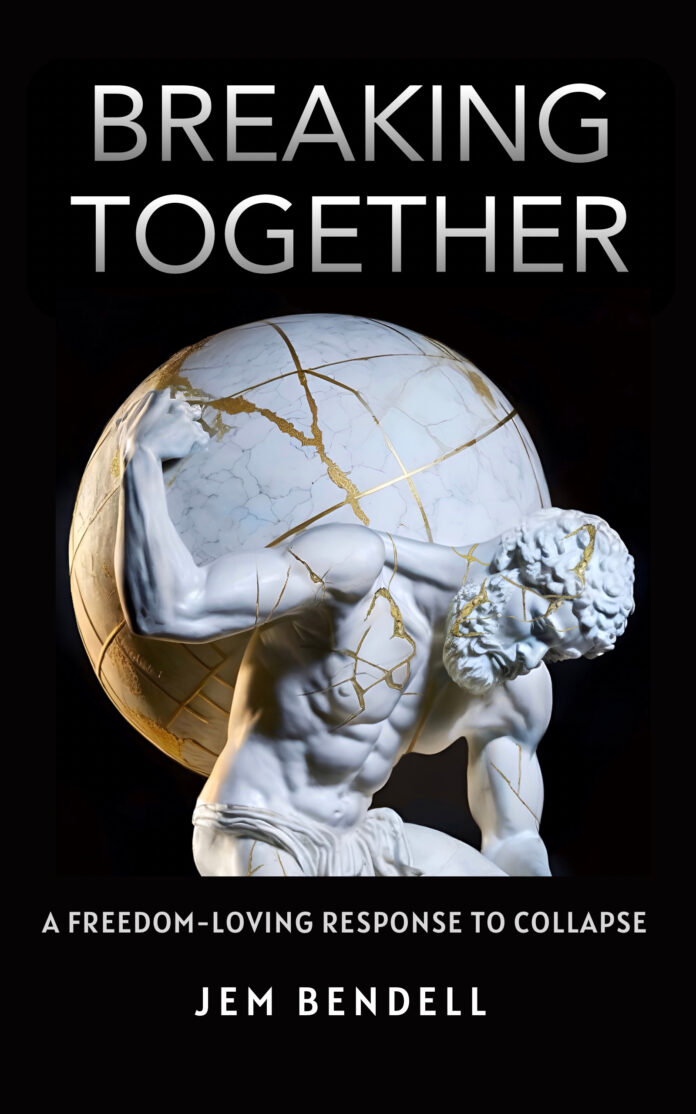(THIS ARTICLE IS MACHINE TRANSLATED by Google from Norwegian)
Breaking Together is a well-documented and thorough book about the collapse of industrial consumer society, about where we stand and where we can go, if we only understand how bad the condition is.
Author Jem Bendell has a background in sociology, writes easily and occasionally slyly (which I like) about what I think is the most difficult topic of all to write about: our own possible downfall. In certain passages he uses the nostalgic 'dear reader' form, which brings us very close to the author's voice. He wants something from us, no doubt. The book's symbolic cover shows how the weight of the globe is about to force Atlas to his knees.
Nuclear power
The book goes to great lengths to document an already advanced collapse and pretty much pulverizes everything to do with technological optimism. The eco-modernists' mantra and belief in 'the green shift' is being shattered. There are no renewable resources that can be called 'sustainable', the world's energy gluttony will not be satisfied by a 'green' energy. Fossil energy is a prerequisite for the entire industrial society, also in the production of 'renewable technology'. Nor is new nuclear power strong enough to meet Bendel's investigative project. He picks apart all arguments for nuclear power. The use of extremely rare minerals is one of his objections; there are not enough of them to meet the world's ever-increasing energy needs. Radioactive waste is another. And not least: Imagine a not improbable total collapse of society and the nuclear power plants' encounter with such a reality. Imagine an increasingly unstable climate, more hurricanes, earthquakes and volcanic eruptions, and the nuclear power plants' encounter with this. I imagine it, and it doesn't look bright.
Censorship and infinite growth
Bendell is one of the few thinkers who was early on with his criticism of the authoritarian mechanisms used in several authorities' handling of covid. In the book, he fully elaborates on this criticism. A toxic mixture of multinational companies, the media, political organizations and social media, which among other things led to a violent censorship of research and science other than what the big pharmaceutical companies promoted. A censorship that was used to call other real academic research 'conspiracy theories'. Censorship is effective. We live in a 'technofeudal' reality, as Bendell calls it. At the touch of a button, our opinions are gone.
These systematized oppressive tools will be used, and have already been used, in the name of the climate. The longing for a smart and kind dictator or a dynamic group of global leaders who can only fix the situation, fix the forest, fix the ocean, is very much alive and present. And some would like to take on that role, because there is money to be made. But as long as endless and continued growth is the incentive for everything we do, it will not be possible to change anything. The system is rigged for collapse, but not rigged to deal with it.
The global capital empire
Through his analyses, Bendell sees a globally dominant 'kingdom' which does not consist of a state or a country, but of global capital. A real money power that rules the world through its interests. Nations, on the other hand, act as the administrators of this empire and intend to strengthen this global capital empire. The values of this kingdom, its own interests, are increased profits. Only this. These values pervade all aspects of the lives of those affected – that is, yours and mine. In the author's opinion, we are all slaves to this empire, and he rightly calls this a form of imperialism or colonialism.
I feel this is the most important thing in the book. It is a very timely and thorough review of how and why our economic system is destroying our planet. The global money interests are the reason why we have reached a time where society and nature are collapsing. Our freedom has been taken from us, and to face the collapse we need freedom more than ever. Saving the world with the same imperialist mindset that underlies the crisis will not be possible.
Local and decentralized
Bendell is no stranger to the systems he criticizes. He has previously worked with strategy development for international companies, UN agencies and international voluntary organisations. In 2012, he was named one of the legendary by the World Economic Forum Young global leaders for his work with sustainable business alliances. He jumped off that merry-go-round when he published his thesis in 2018 Deep Adaption, which unexpectedly set off a whole movement of people starting to prepare mentally and practically to face a total collapse. In 2023, he resigned his position as Professor of Sustainability Leadership at the University of Cumbria in the UK to run an organic farming school in Bali.
He devotes half of the book to updating readers on research that supports the claim about the collapse of the process. The second is devoted to the question of what can be done with such insight. By really seeing how deep we are in the shit, we can begin to shake it off. We can work locally and decentralized to do what we can to reduce the damage caused by the power of money. We can build resilient communities and restore commonly owned resources, so that our needs can be met outside the state or the market economy.
Breaking Togheter is a book that should be read by absolutely everyone, especially local politicians, even if you don't have to agree with the author's conclusions. With such a knowledge-based background, we were able to start a sensible conversation and practice grounded in reality and not in myths or wishful thinking.



